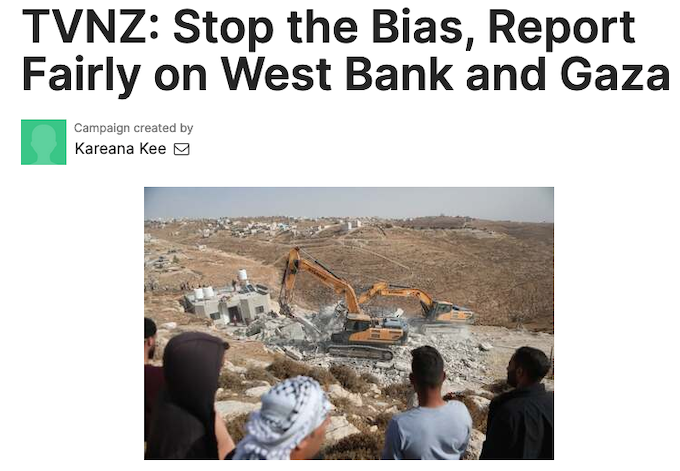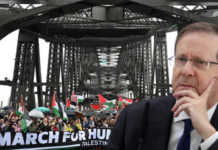
OPEN LETTER: Our Action Station
Dear TVNZ,
We are deeply concerned with the misleading nature of the journalism presented in your recent coverage of the escalating crisis in Gaza and the West Bank. By focusing on specific language and framing, while leaving out the necessary context of international law, the broadcast misrepresents the reality of the situation faced by Palestinians.
This has the effect of perpetuating a narrative that could be seen and experienced as biased and dehumanising.
The International Court of Justice’s ruling on January 26, 2024, mandated that Israel prevent its forces from committing acts of genocide against Palestinians and allow humanitarian aid into Gaza.
- READ MORE: Aotearoa: NZ news media under fire for ‘bias, propaganda’ in Gaza coverage
- Appalling NZ mainstream media reporting on Palestine continues – John Minto
- Israel’s war on Gaza live: Eight killed in Israeli attack on school sheltering displaced Palestinians
This ruling highlights the severity of Israel’s actions and the international community’s obligation to hold those responsible accountable. However, TVNZ’s coverage has often failed to reflect this legal and humanitarian perspective.
Instead it echos biased narratives that obscure these realities. This includes the expansion of genocidal like acts to the West Bank and the serious concerns about the potential for mass ethnic cleansing and further escalation of grave human rights violations.
Under international law, including the Genocide Convention, media organisations have a crucial responsibility to report accurately and avoid inciting violence or supporting those committing genocidal acts.
Complicity in genocide can occur when media coverage supports or justifies the actions of perpetrators, contributing to the dehumanisation of victims and the perpetuation of violence. By failing to provide balanced reporting and instead contributing to harmful stereotypes and misinformation, TVNZ risks being complicit in these grave violations of human rights.
Tragic history of attacks
New Zealand’s own tragic history of attacks on Muslims, such as the Al Noor Mosque shootings, should serve as a powerful reminder of the consequences of dehumanising narratives. The media plays a pivotal role in shaping public perception, and it is deeply concerning to see TVNZ contributing to the marginalisation and demonisation of Muslims and Palestinians through biased reporting.
We urge you to review your coverage of the genocide to ensure that it is fair, balanced, and aligned with international law and journalistic ethics. Specific examples of biased reporting include recent stories on Gaza that failed to mention the ICJ ruling or the context of an illegal occupation.
This includes decades of systematic land confiscation, military control, restrictions on movement, and the suppression of Palestinian voices through media censorship and the shutdown of local newspapers. Accurate and responsible journalism is essential in fostering an informed and empathetic public, especially on matters as sensitive and impactful as this.
On August 29, 2024, TVNZ aired a news story that exemplifies problematic media framing when reporting on the Israeli-Palestinian conflict. The story begins by benignly describing Israel’s “entry into the West Bank” as part of a “counter-terrorism strike”— the largest operation in 10 years — implying that the context is solely anti-terrorism.
Automatically, the use of the word terrorism, sets the narrative of “good Israel” and “bad Palestinian” for the remainder of the news story. However, the report fails to mention numerous critical aspects, such as the provocations by Israel’s National Security Minister, Itamar Ben-Gvir, visiting the Al-Aqsa Mosque and threatening to build a synagogue at Islam’s third holiest site, or Israel’s escalations and violation of the Fourth Geneva Convention.
The Convention considers the transfer of an occupying power’s civilian population into the territory it occupies a war crime, and under international law, Palestinians have the right to resist such occupation, a right recognised and protected by international legal frameworks.
The story uses footage, presumably provided by the IDF, that portrays the Israeli military as a calm, moral force entering “terrorist strongholds”, which is at odds with abundant open-source footage showing the IDF destroying infrastructure, terrorising civilians, and protecting armed settlers as they displace Palestinians from their homes.
Bulldozers used to destroy Palestinian homes
It portrays the IDF entering the town with bulldozers, but makes no mention of how those bulldozers are used to destroy Palestinian homes and infrastructure to make way for Israeli settlements.
Furthermore, the report fails to mention that just last month, the Israeli government announced its plans to officially recognise five more illegal settlements in the West Bank and expand existing settlements, understandably exacerbating tensions.
The narrative is further reinforced by giving airtime to an Israeli spokesperson who frames the operation as a defensive counter-terrorism initiative. The journalist echoes this narrative, positioning Israel as merely responding to threats.
Although a brief soundbite from a Palestinian Red Crescent worker expresses fears of what might happen in the West Bank, the report fails to provide any counter-narrative to Israel’s self-defence claim.
The story concludes by listing the number of deaths in the West Bank since October 19, implying that the situation began with Hamas’s actions in Gaza on that date, rather than addressing the illegal Israeli occupation since 1967, as the root cause of the violence.
Why is this important?
The news story is a violation of the Accuracy and Impartiality Standard with TVNZ failing to present a balanced view of the situation in Palestine, potentially misleading the audience on critical aspects of the conflict.
Secondly, the news story violates the Harm and Offence Standard, being an insufficient and inflammatory portrayal of the genocide and ethnic cleansing in Palestine contributing to public misperception and harm.
Additionally, there is a concern regarding the Fairness Standard, with individuals and groups affected by the conflict not being given fair opportunity to respond or be represented in the broadcast.
These breaches are significant as they undermine the integrity of the reporting and fail to uphold the standards of responsible journalism. Holding our media outlets to high journalistic standards is essential, particularly in the context of the genocide in Gaza.
The media plays a significant part in either exposing or obscuring the realities of such atrocities. When news outlets fail to report accurately or neglect to label the situation in Gaza as genocide, they contribute to a narrative that minimises the severity of the crisis and enables and prolongs Israel’s social license to continue it’s genocidal actions.
Should there be no substantial changes to address our concerns, we will escalate this matter to the Broadcasting Standards Authority for further review.








































